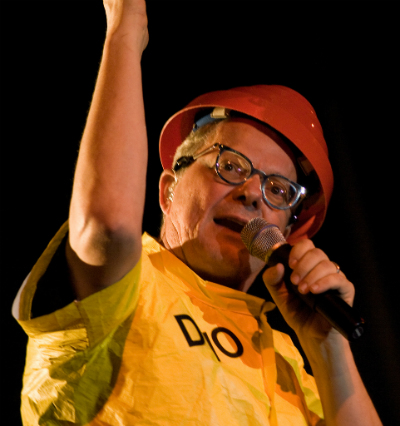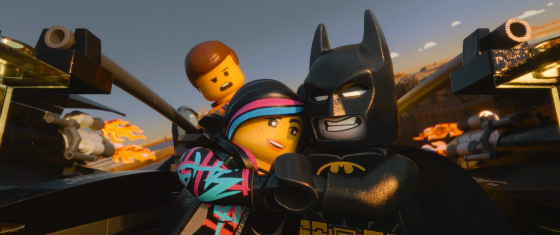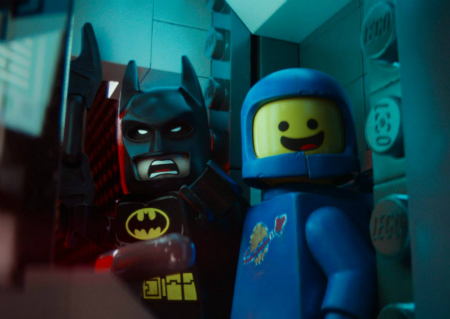TR Interview: Everything Is Awesome When Mark Mothersbaugh Scores The Lego Movie
 |
| Nathan Wind as Cochese |
When a movie soundtrack problem comes along, Devo’s Mark Mothersbaugh must whip it into shape, and with The Lego Movie, he most certainly has. “Everything Is Awesome” hasn’t left the head of anyone who has seen the film, and the new Batman theme might be the best thing since the sixties gave us “Duh nuh nuh nuh nuh nuh nuh nuh.”
We got the chance to talk to Mark about how you score when faced with a plastic brick wall. The answers may surprise you.
Luke Y. Thompson: Congratulations on being associated with such a great movie! Everybody is clearly loving it, and I’ve seen it twice already. Is there any difference, any sort of greater degree of fun, in scoring something like this – something you’re pretty sure is going to be received well, versus something like It’s Pat, where there’s a little more anxiety that it might not?
Mark Mothersbaugh: You know what? I kind of got most of that. Can I just answer what I think you said?
LYT: Certainly!
MM: Should I couch it in a question, and then give an answer?
LYT: Any way you’d like.
 |
MM: Then you can say, “That made no sense what he answered!” You were asking if there was anything special about – is there anything special about a movie like this, meaning The Lego Movie, that makes you score it differently than you would another film – is that it?
LYT: No, that isn’t it. My question was is it more fun to score a movie where you kind of know that it’s going to be very well-received, versus something like It’s Pat: The Movie, where there is probably more anxiety that it might not be?
MM: Oh! Ha ha ha! Well, you know, I think that makes it easier. I think that makes it easier to know that they aren’t depending upon you to figure out how to reinvent the movie. Sometimes you get to a film, and the script was pretty good, so you signed on, and then you get there, and you see it, and you go, “What happened?” And then the director comes in and goes, “Oh, the lead actor, he had diarrhea for the second week, the whole second week, and it didn’t matter what kind of scene we were doing, he was grimacing the whole time because he was trying to hold it in. He pooped his pants on the third day. It took us out of shooting for three hours, we missed the sun, you’ve got to bring the sun out in the fight scene, and you have to make him look like he’s actually happy that they’re getting back together again.”
 |
So you get all of these things with some of these movies, where you’re like, “Oh my god. How do we do that?” You can’t save a movie, and then the directors are panicked. They’re begging you to save them. And you’re like, “I can only do so much.” I can’t reshoot your film for you.
But, you know, on a film like this, where I think everybody felt pretty good about it from the start. The script was pretty strong. There were a never times, I have to say – I can say that Warner Brothers was a little afraid that maybe I went too far with the electronics, and they were scared. I said, “Look, the electronics – I scored the whole movie electronically, but I also scored the whole movie with an orchestra, so when [directors]Phil [Lord] and Chris [Miller] are doing their final their final mix, they can adjust it one way or another if they want to, because they were already on 22 Jump Street, so I didn’t get to have as much interaction as I had on the first three films I did with them.
They were busy, in New Orleans while I was down in Australia, recording. So I just thought I’m going to cover things – over-cover thing, so that’s what I did. I gave them a lot of stuff to work with when they did their final mix, so that they could adjust it whichever way they want.
But yeah, the film – I felt like it was going to be a big film, from the beginning. Although, you think about Legos, and a big part of the country was, like, “You wrote a movie about Legos? That’s got to be Barney. It’s going to be a Barney movie for kids.” So these guys are pretty great, the way they can take a property like that, and make it resonate with people of all ages. That’s a pretty great talent to have.
LYT: How much of “Everything Is Awesome” was in the script? I know at the recent press conference I was at, they said it says in the script…
MM: “Everything Is Awesome” may have pre-dated the script. I mean, it might have existed ahead of time. Because awesome, and everything being awesome, I think it came out of a TV show I was doing for about three or four years before they started on The Lego Movie, and it’s called Yo Gabba Gabba! for little kids, where about three or four times during the show, every episode, the host of the show goes, [enthusiastically]“That’s awesome!” and all the kids scream. Phil and Chris and I were friends back then, and they were kind of paying attention to Yo Gabba Gabba! about maybe working on a film together with that. And then the next thing they went on to was Lego, and then, when I saw the script, “Everything Is Awesome” was already written into the script at that point, and they had already done a rough recording of it, so they already had a song pre-existing before anything was happening with animation yet. And then rough cuts for animation started coming in, and later on, the song got embedded in the film in a number of places.
And it was a very smart – not to over-talk about “Everything Is Awesome” – it was a very smart song, a smart idea. They had this song that starts off as an irritating piece of sound bite that they was used to, like, spur on the people of Legoland to conform and go to work every day, but by the end of the movie, it’s like this evil sound bite turns into kind of an emotional moment when you hear the lyrics, and then, because of a turn in the film, it becomes ironic, and now it’s about people working together an collaborating to do the bigger thing. So, they’re pretty good writers. I think they deserve an A for this one.
LYT: So how much of it was there in their original recording, and how much did you enhance it to where it is today?
MM: Well, you know, I would like to take all the credit for it, but I can’t. I’m telling you, they wrote the song before I got there, and I ended up – I produced it, I added all sorts of instruments, including orchestral versions in part of the film, and had a choir singing it somewhere in the movie, and I recorded Tegan and Sara came over here to my studio, but Lonely Island – they were in New York, so I just sent them the tapes, and they worked on it in New York. It still always retained the original concept.
LYT: And how much of the Batman song was you?
MM: The music. Phil and Chris wrote lyrics – I mean, wrote the words, and then Will Arnett kind of pre-formed a little bit on it when he was singing, so it was kind of like a collaboration with everybody.
LYT: It’s funny, I always thought – I think I first realized you were a movie composer as well as a pop star when the Rugrats movie came out. So I looked up your biography, and you’ve been doing it since like Pee-wee’s Playhouse and Revenge of the Nerds 2, since before it was sort of normal for pop musicians to cross over. Was there any stigma at that time? Were studios like, “No, we don’t want a pop guy. We need an orchestral guy”?
MM: The reason why it happened? It was accidental. I just kind of fell in. Somewhere in the mid-80’s, Devo kind of went into a cocoon – hibernation – siesta state – we kind of went to sleep for a while. My friend Paul Reubens asked me to score Pee-wee’s Playhouse for him, so that’s how that happened. That’s how it started, and it became one of those things where I had been doing albums with Devo, and we’d write those songs, record it, make a video, rehearse it till we’d go on tour, and then by the time you were done, it was a year later before you started the next record, and you’d do 12 more songs.
I did Pee-wee’s Playhouse, I got to write 12 songs’ worth of music in one week, and something about that was so much more exciting to me than getting to write 12 songs a year, so I caught the bug of scoring right away.
LYT: Was that before or after you were in Human Highway?
MM: Human Highway was before that, by about four or five years, and the music that I wrote for Human Highway is actually – I had written for a play that Russ Tamblyn was starring in and Dean Stockwell was directing, and I wrote the music for this off-Broadway play, and then they were both working with Neil Young on Human Highway, so I gave them my music. So about half of the music for Human Highway is music I had written for something else that had just gotten repurposed for Human Highway.
LYT: What’s it like doing a video game score? Do you have to do multiple alternate takes for whatever happens?
MM: Oh, video games – they’re like a whole other kind of way to think about being an artist. I find it really satisfying. Because you think about your music – if you’re writing music for a video game, you don’t record the orchestra all in one pass. You record, like, maybe the low things, like bass, and things down – double bass – you record all that stuff first. And then you record your medium instruments, maybe your woodwinds and your brass and maybe you add your strings on next, then you add your percussion on last.
What you’re doing is you’re writing a piece of music that can be listened to in four different incarnations, and they all have to be seamless, because like, let’s say Homer Simpson is running around a food court and he’s gathering up milkshakes and hamburgers. Maybe at first it’s just these low bass sounds, that are playing legato – they’re playing whole notes, and then you bring in the cellos and maybe the woodwinds, and they’re playing quarter notes. So maybe when Homer grabs a – makes a certain amount of points, then the music kicks in – the other instruments kick in, and they double the tempo. Then when he goes to the next level – and it can take anywhere from 10 seconds to 10 minutes, depending on the kid, and how often they’ve played the game – the music keeps playing.
But then all of a sudden there are scenes that grab – they win the next level, move to the next level, and the music has to seamlessly change. So you’re writing this music that keeps getting more and more intense and more exciting and more sped up, so by the time you get the percussion on it, maybe sixteenth notes, so it’s going really fast. So this music started off as this slow, kind of easygoing music, has now become very frantic, and I love that! I love thinking about music like that, too. It’s like a whole other way to think about music.
LYT: Are you much of a gamer yourself?
MM: I’m not going to tell you what games I play, but yeah. There are games at my house every day, and even my wife – she gets stressed out enough at work, but then she starts zoning out in games. Both my daughters – they can’t not touch their iPads.
LYT: Mark, thanks very much! We’re all hoping for an Oscar nomination for “Everything Is Awesome.”
MM: OK – I hope I get to talk to you after Lego 2.
LYT: I hope so too! Thanks again.
